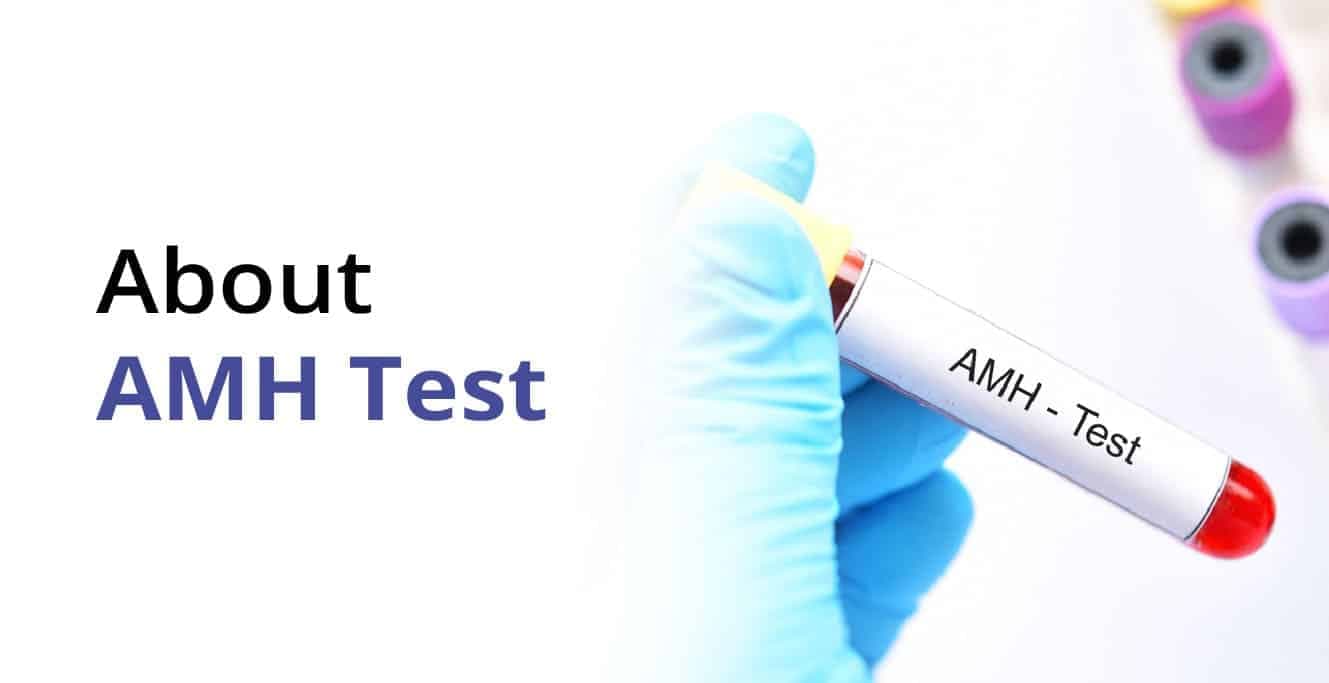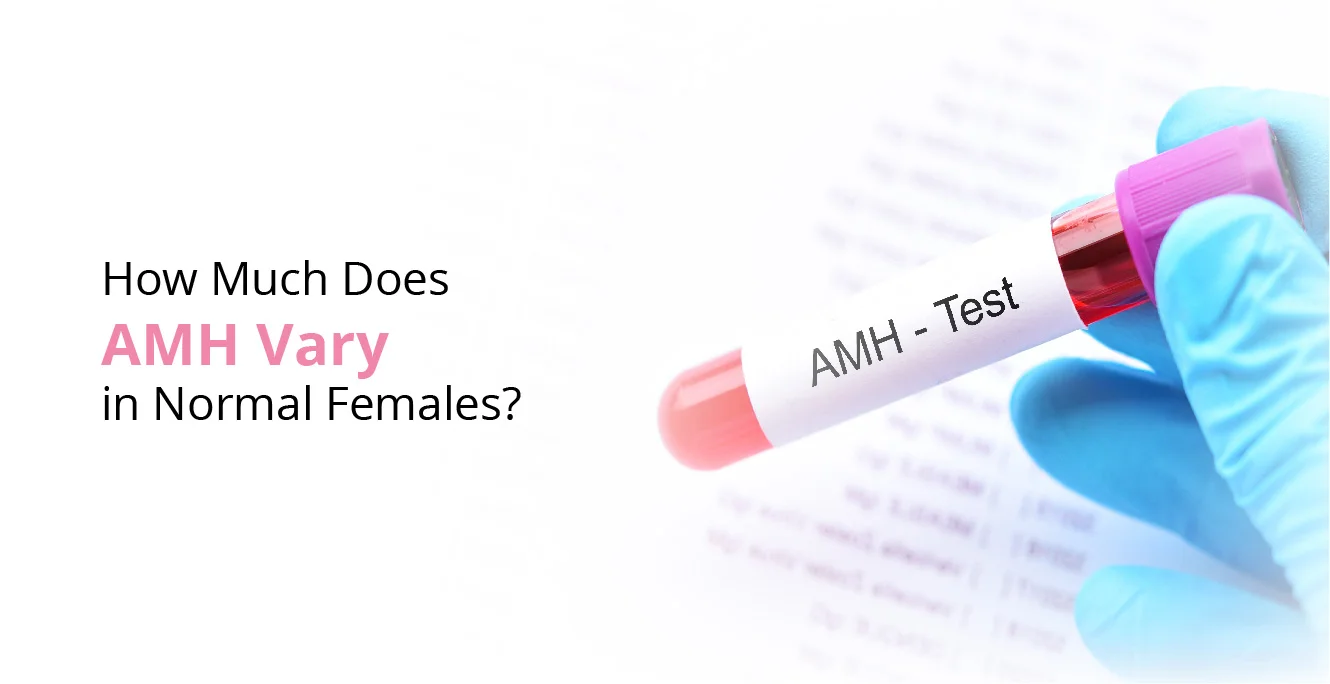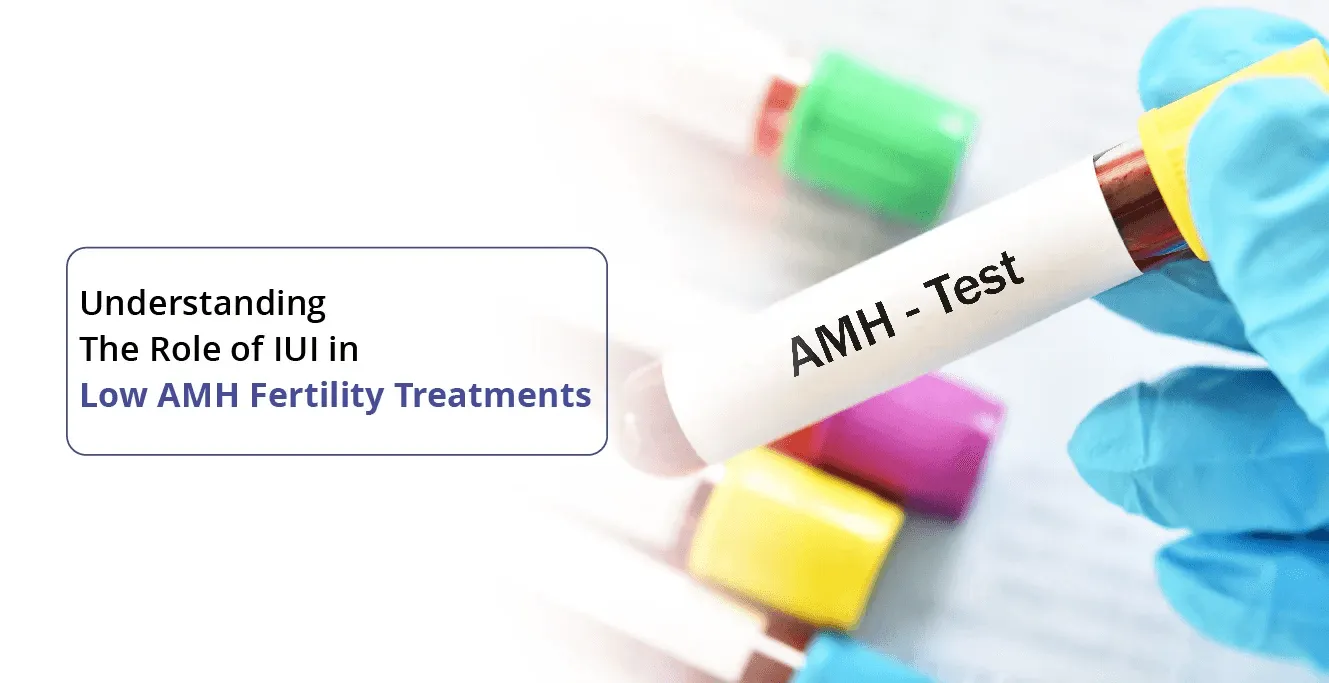
Anti Müllerian Hormone Test: Purpose, Levels & Results

Table of Contents
Ever wondered how doctors assess a woman’s egg reserve or fertility potential?
That’s where the AMH test comes in. The full form of the AMH test is Anti-Müllerian Hormone test. It is a simple blood test that offers valuable insight into your ovarian health and helps guide fertility planning.
Whether you’re trying to conceive or just want to understand your reproductive health better, this test can provide useful information.
Before we get into the details, let’s first understand what this test really means and why it matters.
What is an AMH Test?
You might be wondering what an AMH test is used for. An AMH test is often used as a basis for fertility treatment, particularly IVF treatment, since it helps check for low ovarian reserves.
Follicle cells in the ovaries release AMH. Follicles are the tiny sacs inside the ovaries that produce eggs. The cells release this hormone at the initial stage of a follicle’s development.
For this reason, AMH levels are correlated with ovary function and follicle production. As a woman, the number of ovarian follicles you produce gradually reduces as you get older, and so does the quantity of AMH in your blood.
The AMH test is also used for issues related to ovarian dysfunction, like PCOS (polycystic ovary syndrome), as well as ovarian cancer treatment.
Why Do You Need an AMH Test?
AMH is present in both men and women. For women, AMH levels are reflective of their ovarian reserve, i.e., the capacity of their follicle pool. Therefore, the AMH test is a useful indicator of fertility.
It can also indicate how you will respond to ovarian stimulation initiated for IVF treatment. Higher AMH levels mean that your ovaries are likely to be more responsive to stimulation to produce eggs. Lower AMH levels mean that your ovaries are likely to be less responsive. This is another reason why the AMH test is so important.
For pregnant women, AMH plays an important role in the development process of a foetus. It helps in developing the sexual organs of a foetus in the womb. It plays a significant role in the sex differentiation of the male foetus. The female foetus does not need as much AMH to develop female sex organs. However, the male foetus requires high amounts of AMH to develop the male sex organs. In the male foetus, AMH also suppresses and prevents the development of female organs. The AMH test is thus useful for foetal health concerns as well.
When to Do an AMH Test?
- When planning or delaying pregnancy to understand your fertility potential.
- Before starting fertility treatments like IVF or egg freezing.
- If you have irregular periods or symptoms of PCOS.
- After certain medical treatments (like chemotherapy) that may effect fertility.
- To assess ovarian reserve in cases of unexplained infertility.
How to Treat AMH Levels?
Both low and high AMH levels can indicate a concern that needs to be addressed through treatment. The treatment options for both are given below:
Low AMH Levels
The average AMH level for a woman is between 1.0-4.0 ng/ml. AMH levels of less than 1.0 ng/ml are considered to be low, and this indicates a lower chance of pregnancy.
As for normal AMH levels, they differ based on your age. The base level of AMH reduces from age 25 to 45.
Coming to low AMH treatment and how to increase AMH levels, they can be improved through a combination of lifestyle changes, regular exercise, Vitamin D supplements, and diet.
DHEA (Dehydroepiandrosterone) supplements also help in low AMH treatment. DHEA is a hormone that is converted to sex hormones in both men and women. However, it must be taken cautiously as it may have various side effects.
If you have low AMH levels and want to get pregnant, IVF is still a good option. Low AMH indicates that the ovaries are producing a lower number of eggs. However, it does not prevent pregnancy.
Low AMH treatment involves mitigating measures through a specialised IVF treatment plan, which may also include supplements. The IVF treatment will follow strategically designed protocols for ovarian stimulation, along with other methods to mitigate your low AMH levels.
High AMH Levels
High AMH levels (above 4.0 ng/ml) can often indicate PCOS. Women with PCOS may have erratic or excessively long periods and excess levels of male hormones (androgens).
When AMH levels are higher than 10 ng/ml, there is an especially strong correlation with PCOS. For this reason, an AMH test can provide useful indications for such conditions.
High AMH can be balanced with lifestyle and dietary changes. It is also treated with hormonal control methods such as birth control pills and medication that reduces androgen levels.
How is the AMH Test Done?
Here’s how the AMH test is done:
- Simple blood test: The AMH test procedure starts with a simple blood test that measures the level of Anti-Müllerian Hormone in your blood.
- No special preparation: You don’t need to fast or follow any special diet before the test. It can be done at any time during your menstrual cycle, unlike some other fertility tests.
- Sample collection: A small amount of blood is drawn from a vein in your arm by a healthcare professional. The process takes only a few minutes.
- Laboratory analysis: The blood sample is then sent to a lab, where the AMH levels are measured using specialized equipment.
- Quick results: Results are usually available within a few days and are interpreted by your doctor.
- Doctor consultation: Based on your AMH levels, your fertility specialist will discuss what the results mean and how they relate to your fertility or treatment plan.
How to Improve Anti-Mullerian Hormone Levels?
Here are some ways that may help support or improve Anti-Müllerian Hormone (AMH) levels naturally:
- Maintain a healthy weight: Balanced body weight supports hormonal health and ovarian function.
- Eat a nutrient-rich diet: Include foods high in antioxidants, healthy fats, and protein — such as leafy greens, nuts, seeds, eggs, and fish.
- Manage stress: Chronic stress can impact hormone balance, so practice relaxation techniques like yoga or meditation.
- Get enough sleep: Quality sleep helps regulate reproductive hormones.
- Avoid smoking and excessive alcohol: Both can harm ovarian reserve and lower AMH levels.
- Limit exposure to toxins: Reduce contact with harmful chemicals found in plastics, pesticides, and cosmetics.
- Consult your doctor: In some cases, supplements like DHEA or vitamin D may be recommended under medical supervision.
While lifestyle changes can support hormonal health, AMH levels naturally decline with age and can’t be drastically increased.
Conclusion
An AMH test is a useful way to check your fertility levels and plan for pregnancy. It can also help the fertility specialist plan the best course of treatment for you. When considering low AMH treatment and mitigation, IVF treatment is a good option to consider.
If you are concerned about your AMH levels or your fertility as a couple, visit a fertility clinic. Make sure to discuss your concerns with the fertility specialist so that they can suggest the appropriate tests.
To get an AMH test and fertility testing done or to find out about IVF treatment options, visit Birla Fertility & IVF or book an appointment.
FAQs:
What is a normal AMH level?
The normal AMH level for a woman is between 1.0-4.0 ng/ml. Below 1.0 is considered to be low AMH.
What is an AMH test done for?
An AMH test is commonly performed to check the reproductive capacity of a woman in terms of her follicle count. This is useful for fertility checks, planning pregnancy, forecasting the reproductive years she has, and detecting issues like PCOS and ovarian cancer.
What is a good AMH level for different ages?
Based on the age, a good AMH level can be considered as follows:
| Age | Ideal AMH Level |
| < 34 years | 1.25 ng/mL |
| 35 – 37 years | 1.50 ng/mL |
| 38 – 40 years | 1.75 ng/mL |
| > 41 years | 2.25 ng/mL |
In general, a good AMH level is above 1.6 ng/ml. However, keep in mind that it is natural for AMH levels to reduce with age, so low AMH levels at older ages are expected.
What is the best time to get an AMH test?
AMH levels stay reasonably constant and do not fluctuate much through the course of the menstrual cycle. For this reason, the AMH test can be done at any time.
Which AMH level indicates infertility?
An AMH test does not indicate infertility. It only indicates if the chances of pregnancy are reduced due to the lower number of eggs. Less than 0.5 ng/ml is considered to be a very low level of AMH and indicates low fertility.
Can I get pregnant with low AMH?
Yes, low AMH does not prevent you from getting pregnant. Low AMH only indicates that there is less chance of your ovaries producing a mature egg that can lead to pregnancy due to a lower number of eggs.
How is high AMH treated?
High AMH can often indicate PCOS (polycystic ovary syndrome). It can be treated with lifestyle and dietary changes along with regular exercise. It is also treated with hormonal control, such as oral contraceptives and medication that reduces the levels of androgens (male hormones).
What is the AMH test for females?
The AMH test for females measures the Anti-Müllerian Hormone level in the blood to assess a woman’s ovarian reserve or how many eggs she has left. It helps evaluate fertility potential and is often used in planning pregnancy or fertility treatments like IVF.
What is the AMH test for males?
The AMH test for males measures the Anti-Müllerian Hormone level to assess testicular function and sperm production. It helps evaluate conditions like undescended testes or infertility and gives insights into how well the testes are developing or functioning.
Our Fertility Specialists
Related Blogs
To know more
Birla Fertility & IVF aims at transforming the future of fertility globally, through outstanding clinical outcomes, research, innovation and compassionate care.
Had an IVF Failure?
Talk to our fertility experts

 Our Centers
Our Centers




















